 |
|
Lang Luwen/For China Daily |
In the 1970s the Western world gorged itself on fad diets, from Atkins to Scars-dale, and the millions of books about them that were sold helped keep the publishing industry in good shape. About the same time, punk rock music made its world debut.
Turn the clock forward half a century, and dieting and punk have been sewn seamlessly together-in China of all places-to give us pengke yangsheng, the punk diet.
Of course, the thing about fad diets is that often what they most have going for them is a catchy name, and that may well apply to the punk diet. In fact strictly speaking the name seems to describe a lifestyle-an attitude even-rather than a food regime, even if it does relate to what one consumes. Also, as with many new fangled phenomena like this in China, its genesis, or at least the name, seems to have been conceived in cyberspace.
But let's take ourselves away from the internet for a moment and into the real world, and talk about how one can spot a punk dieter. Consider these three pictures: In one hand a young man holds a thermos flask cup with steam pouring out of it, and in the other he holds a glass half full of scotch on the rocks. After staying up for half the night and catching a lot fewer than forty winks a young woman sits there applying the most expensive face pack to her visage. A group of three hits the disco floor, ostensibly to keep fit, and between dances imbibes whiskey soaked in goji berries.
So unlike a conventional diet that runs a straight line emphasizing healthy eating and engaging in physical activity, the punk diet, championed by Generation Z, those born this century, bounces back and forth between extremes, its practitioners taking great delight not only in the irony but in the fact that they are leading an oh-so trendy lifestyle as well.
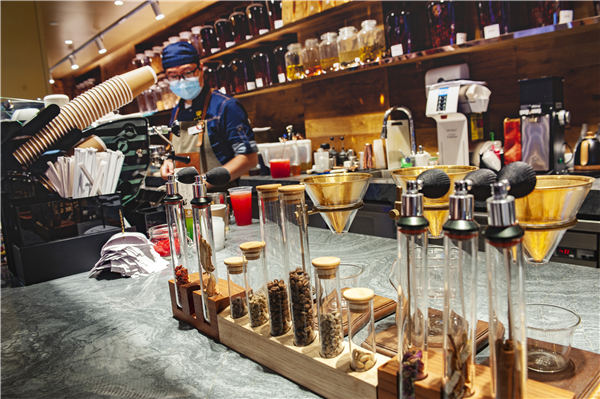 |
|
Unlike a conventional diet that runs a straight line emphasizing healthy eating and engaging in physical activity, the punk diet, championed by Generation Z, those born this century, bounces back and forth between extremes, its practitioners taking great delight not only in the irony but in the fact that they are leading an oh-so trendy lifestyle as well. [Photo provided to China Daily] |
However, when you delve below the thin surface of all this, you find that young people do seem to have piled on themselves-or had piled on them-such a weighty load of academic and work pressures that it is no wonder that at such an early age they have cottoned on to the idea that they had better start caring for their health, too.
Last year National Health Insight Report published by Dingxiang Doctor, a dedicated medical information app, said that of the four age groups, the post 1960s, 70s, 80s and 90s, the younger the person was, the dimmer the view they had of their personal health.
"On the one hand is fast-paced work and life generally, and on the other is anxiety about losing one's competitive edge," says Jiang Wenxiu of the Department of Psychiatry, Zhongda Hospital, Southeast University in Jiangsu province.
"Young people always seem to feel that they must do something to defend their hairline, or to resist the fine lines that climb up around the corners of their eyes."
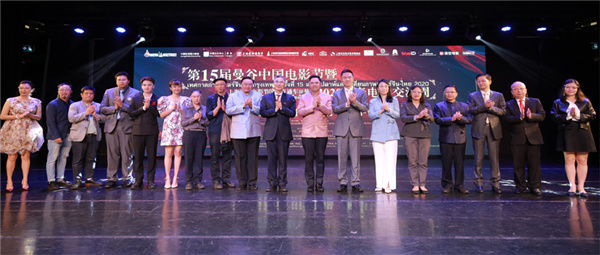 |
The 15th Chinese Film Festival in Bangkok and the 2020 China-Thailand Film Exchange Week opens at the China Cultural Center in Bangkok on Oct 25, 2020. [Photo provided to Chinaculture.org] |
On Oct 25, the opening ceremony of the 15th Chinese Film Festival in Bangkok and the 2020 China-Thailand Film Exchange Week was held at the China Cultural Center in Bangkok. The event was hosted by the China Cultural Center in Bangkok and received strong support from the Chinese Embassy in Thailand and the Thai Ministry of Culture.
The COVID-19 pandemic doesn't impede the enthusiasm for cultural exchange between China and Thailand. This film festival uses live broadcast to present the opening ceremony and host the "China-Thailand Film Exchange and Cooperation Online Seminar". During the film festival, audiences can use the online platform of the China Cultural Center in Bangkok to watch films online, which greatly increases the global reach of the festival.
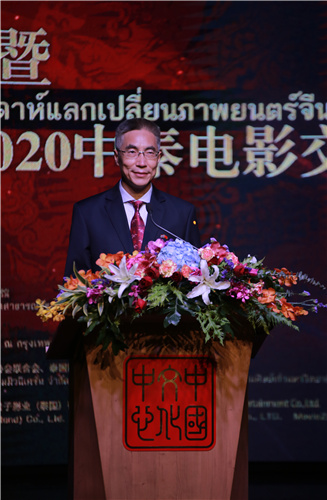 |
Gu Hongxing, director of the China Cultural Center in Bangkok and China Tourism Office in Bangkok, speaks at the opening ceremony. [Photo provided to Chinaculture.org] |
Gu Hongxing, director of Bangkok's China Cultural Center and China Tourism Office, said film can not only introduce one's national culture, but also reflect unique social landscapes. Film has become an important part of cultural exchange between countries and enhance mutual understanding among people around the world.
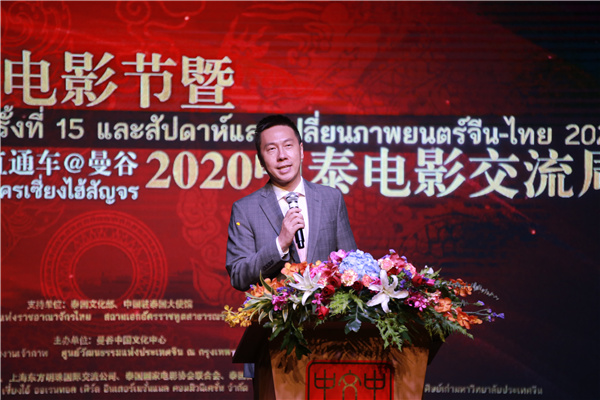 |
Yang Xin, Chargé d'affaires of the Chinese Embassy in Thailand, speaks at the opening ceremony. [Photo provided to Chinaculture.org] |
Yang Xin, Chargé d'affaires of the Chinese Embassy in Thailand, said since the establishment of diplomatic relations between China and Thailand 45 years ago, the mutual trust between the two countries has continued to deepen, economic and trade cooperation has expanded, cultural exchanges have become closer, and all-around cooperation has achieved fruitful results. Both China and Thailand have a vast film market. As a traditional project of cultural exchanges between China and Thailand, the Bangkok Chinese Film Festival has laid a solid foundation for film cooperation between the two countries for 15 years and will add new drive to the promotion of cultural exchanges and cooperation between China and Thailand.
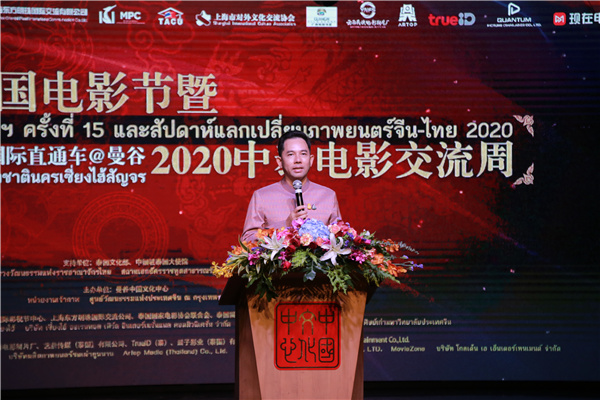 |
Itthiphol Kunplome, Thailand's minister of culture, speaks at the opening ceremony. [Photo provided to Chinaculture.org] |
Thailand's Minister of Culture Itthiphol Kunplome said in his speech the governments and people of Thailand and China have been in constant exchange. Cooperation in various fields has developed steadily, and the film festival is another important event to further promote cultural exchanges between the two countries. The people of the two countries can promote their understanding of the cultures of both sides through films, and promote friendly relations and cooperation in other perspectives.